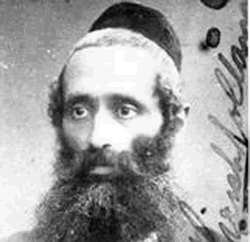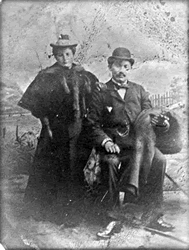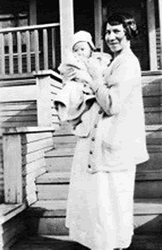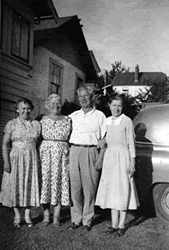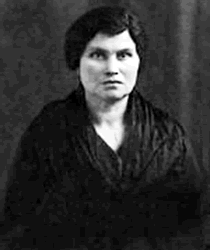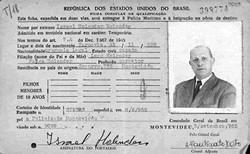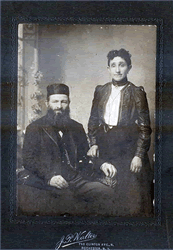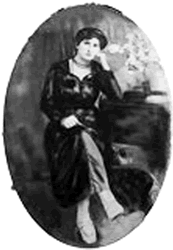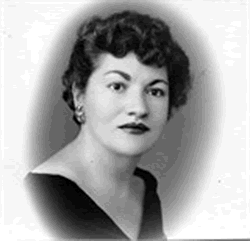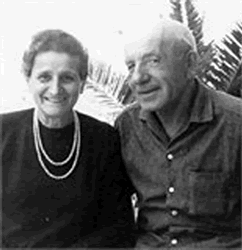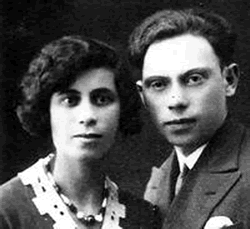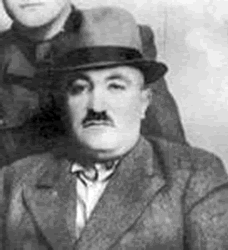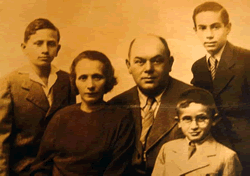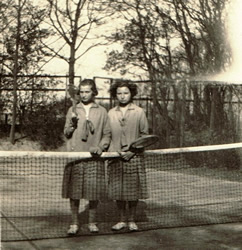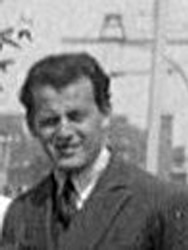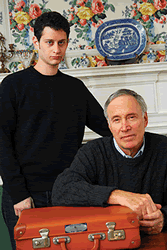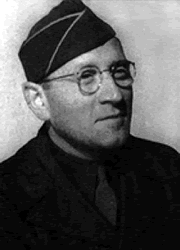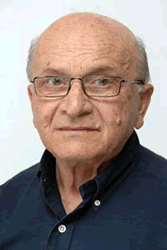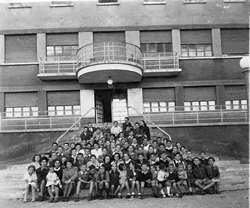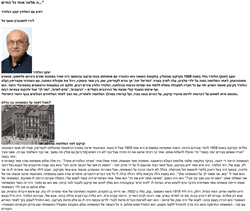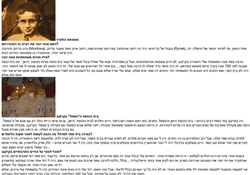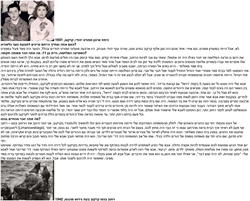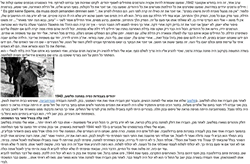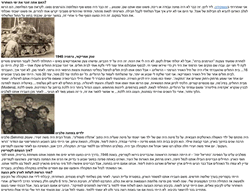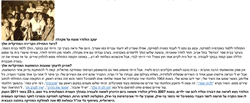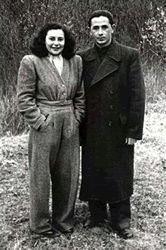#hldr-1
Jehoshua Hershl Hollander
Birth; July 23, 1870
Nowy S?cz, Poland
#hldr-2
Moses Hirsch Hollander (1810-1899)
#hldr-3
Abraham Lustik with wife Lena nee Hollander (1876-1911)
#hldr-4
Leah Hollander and Zelda
#hldr-5
Aharon Hollander with family
#hldr-6
Feiga Holender
#hldr-8
Morris and Rachel Hollander
#hldr-9
Rykla Hollander
#hldr-10
Esther Hollander
#hldr-11
Lea and Dov Hollander
#hldr-12
Zipora Pepe Peril Landau (born Hollander Landau)
1909 Chrzanow, - 1943 murdered in Auschwitz
#hldr-13
Joshua Hollander
#hldr-14
Abraham and Regina Hollander with their children Dolek ( standing on the right), Banek on the left, Jacob (bottom right) . Jacob is the only one who survived the holocaust. He became a well known musician/ composer in Israel.
#hldr-15:
Frida Hollander (born Lipschutz)
R
Pepka (Penina) Lipschutz (born Rakower/Pos/Bleicher)
#hldr-16:
Pinchas Hollander
Schaindl Hollaender nee Reikh was born in Rozwadów, Poland in 1875 to Leib and Dvora. She was married Juer. Prior to WWII she lived in Cracow, Poland. During the war she was in Cracow, Poland.
Schaindl was murdered in the Shoah.
This information is based on a Page of Testimony (displayed on left) submitted by her son MENASHE HOLLANDER OF TEL AVIV .
Jair / Yair Hollaender was born in Cracow, Poland in 1939 to Menashe and Mate. He was a child. Prior to WWII he lived in Cracow, Poland. During the war he was in Cracow, Poland.
Jair was murdered in the Shoah.
This information is based on a Page of Testimony (displayed on left) submitted by his father Menashe ( Meashe had another son Albert Ze'ev Hollander who survived and lives in Israel.
Frimet Stadlen nee Holander was born in Krakow, Poland in 1904 to Yair and Sheindl. She was married Yitzkhak and had a son Moshe who also perished at age 10. Prior to WWII she lived in Krakow, Poland. During the war she was in Nowy Sacz, Poland.
Frimet was murdered in the Shoah.
This information is based on a Page of Testimony (displayed on left) submitted by her brother Menashe.
Jehoshua Hollander was born in Novi Sonsch, Poland in 1875. He was married Doba nee Spinger. Prior to WWII he lived in Cracow, Poland. During the war he was in Cracow, Poland.
Jehoshua was murdered in the Shoah.
This information is based on a Page of Testimony (displayed on left) submitted by his granddaughter.
Tobias Rapp was born in Lemberg, Poland in 1895 to Elkana and Judith. He was married Devorah nee Hollander. Prior to WWII he lived in Lemberg, Poland. During the war he was in Lemberg, Poland.
Tobias was murdered in the Shoah.
This information is based on a Page of Testimony (displayed on left) submitted by his daughter
Dorothee Korall nee Rapp
Yocheved Hollander was born in Cracow, Poland in 1902 to Osias and Doba. Prior to WWII she lived in Cracow, Poland. During the war she was in Cracow, Poland.
Yocheved was murdered in the Shoah.
This information is based on a Page of Testimony submitted by her niece Dorothee Korall nee Rapp.
.
Rache Hollander was born in Cracow, Poland in 1912 to Jehoshua and Doba. She was married to Oswald ?. Prior to WWII she lived in Cracow, Poland. During the war she was in Cracow, Poland.
Rache was murdered in the Shoah.
This information is based on a Page of Testimony (displayed on left) submitted by her niece Dorothee Korall nee Rapp.
Fatherland
Rich Hollander and son Craig
Rich Hollander knew little of his father's life in Poland or the family left behind there — until he found a briefcase full of swastika-stamped letters written in a language he couldn't read.
By Rich Shea
Photos by Frank Klein
The day Rich Hollander, A&S '70, climbed the stairs to his parents' attic was a day he'd dreaded. Months earlier, on October 22, 1986, after returning home from his job as a reporter for WBAL-TV News in Baltimore, he'd received a phone call. "Mr. Hollander," a police officer said, "I have some bad news for you." Joseph and Vita Hollander, driving back from a relative's house, were a few miles from home in a New York City suburb when, for unknown reasons, their car swerved off the road and plowed into the side of a store, killing husband and wife almost instantly. Hollander, then 38 years old, was their only child.
Now, he had to clean out the split-level house they'd lived in for almost 30 years — a wrenching process he wanted to finish as quickly as possible. "Everything was in suspended animation," Hollander says. "They were expecting to come back. The toothbrushes were there, the bathrobes hung, food in the pantry."
The attic seemed the least personal space in the house, littered only with empty airline bags from his father's travel agency. But after tossing a few, Hollander came across a tan plastic briefcase labeled "Air India." He could tell something was inside. "So I open it up," he recalls, "and I see, very neatly stacked with rubber bands, these letters. And virtually every letter has Nazi stamps on it — swastikas. And, also, there were lots of personal documents, dating back to 1939."
Up to this point, he knew only fragments of his father's past: Joseph was a Jewish immigrant who had fled Poland as the Germans invaded; was once married to a woman who wasn't Rich's mother; and had trouble entering the United States. He'd also left behind family members in Krakow, all of whom perished during World War II. But Joseph had never discussed how they died. As generous as he was in every other aspect of his life, he refused to talk in detail about his mother, sisters, brothers-in-law, and nieces, or display their photos in the house.
But Rich, his hands shaking as he perused the letters, recognized his grandmother's name: Berta. And the letters, written in Polish and German, had been sent from Krakow. "I knew, instantly, they were from [my father's] family," he says.
Still consumed with grief, and unable to translate the letters, Hollander stuffed them back in the briefcase, which he took home to Baltimore. It stayed shut as he transitioned from journalism to business and, with wife Ellen, an attorney, raised three children. Not until 2000, after the kids had grown and he'd thought about the potential significance of the correspondence, did he reopen the briefcase and set in motion a series of events that would result in Every Day Lasts a Year, a multi-author book that recounts what he calls "parallel Holocaust stories." While the Hollander family, trapped in Nazi-occupied Krakow, wrote to Joseph, hoping he could provide them with potentially life-saving emigration papers, he was himself engaged in a harrowing legal battle with a U.S. government dead set on deporting him.
In telling his father's story, Hollander set out to answer two questions: How did Joseph make his way to the United States, and how did he deal with his family being wiped out?
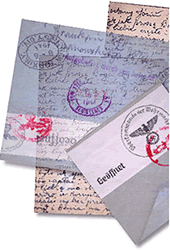
It's a dramatic story — one that includes as a character Craig Hollander, Rich's son, who collaborated on the book and is now a second-year PhD student in history at Johns Hopkins — but it also has historical value. Christopher Browning, one of two Holocaust scholars who contributed to Every Day, says that, compared with random letters, "a virtual complete run for over two years, fall of '39 to December of '41, reflecting the views of three generations" is a windfall of primary-source material.
The book enables readers to observe how one middle-class family endured under extreme duress. The Hollanders, mindful of Nazi censors, were cautious in their descriptions of wartime Krakow and stuck to discussing family issues. Getting to know them, while cognizant of their fate, makes Every Day both fascinating and heartbreaking. In putting the book together, Hollander knew he'd have to break one of his cardinal rules. When he taught journalism, he explains, "the first thing I would say to my students is, 'You are not the story. No one gives a damn what you have to say.' Well, I couldn't escape that here."
Hollander owns and operates Millbrook Communications, a sports-marketing firm in a converted mill on the outskirts of Baltimore. At 59, he's fit, trim, and gray-haired, and prefers wearing something casual, like jeans and a flannel shirt, to work. He doesn't sit still for long, even while discussing a favorite subject. When he's engaged in conversation, words tumble from his mouth. Craig, who at 26 is specializing in early-American history at Hopkins, says his dad is intellectually curious about almost everything. "He's really annoying to bring to restaurants," he adds, "because heaven forbid if the waiter is from another country."
An admitted news junkie, Hollander was a political science major at Hopkins, where he was also sports editor of The News-Letter, then went on to attend the Medill School of Journalism at Northwestern University. He later worked for the now-defunct Baltimore News American for five years and on TV for another 12. Hollander enjoyed reporting, but because of the hours, he says, "I was missing too many Little League games." So he retired from the profession. When he began his research for Every Day a few years ago, he was forced to call on his old skills.
The book, published in November by Cambridge University Press, is divided into three parts: "Joseph's Story" is Hollander's account of his father's escape from Poland; "Krakow," written by Browning and Holocaust survivor-scholar Nechama Tec, puts the Hollanders' correspondence in historical context; and "The Letters" is a full run of the correspondence itself, annotated by Browning and Craig Hollander, who decipher the coded language used by family members who knew the Nazis would be reading their mail. The letters alone, Hollander knew, wouldn't be enough for a whole book, partly because Joseph's responses, sent to Krakow and never copied, were missing.
In telling his father's story, Hollander set out to answer questions that Browning, best known for his book Ordinary Men, posed to him early on: How did Joseph make his way to the United States, and how did he deal with his family being wiped out?
The answers weren't found only in the Krakow letters. Hollander also had discovered, elsewhere in his parents' house, love letters they wrote to each other and an autobiography Joseph had begun for his grandchildren — Hillary, Craig, and Brett — in 1985. In it, he writes of growing up in Krakow, earning a law degree, running a travel agency, and enjoying a comfortable lifestyle before leaving Poland with his wife, Felicia, at age 34. Curiously, the autobiography, at 40 handwritten pages, stops short of his escape. "Did he stop there because he wasn't able, psychologically, to go on, or is that the point he'd reached before the accident?" Hollander asks. "I don't know the answer to that."
He did have the personal papers, including Joseph's passport, that he'd found in the briefcase. And after contacting the National Archives in Washington, D.C., where he hoped to find an immigration-related document or two, Hollander unearthed another treasure. "Within five minutes," he says, "they told me they had a 350-page file on my father." A subsequent inquiry at a New York federal court turned up hundreds of pages of legal transcripts as well — pertaining to deportation hearings. "I couldn't believe this all had to do with my father," he recalls.
What Hollander discovered turned out to be so compelling that his chapter on Joseph, originally slotted between "Krakow" and "The Letters," was moved to the front of the book. It also helped explain Joseph's unlimited resourcefulness. Here was a guy who, during a blizzard in the '50s, hitched a ride in the back of a diaper truck so he could catch a plane for a business trip. Whenever a friend or family member was in need, "no problem was insurmountable," Hollander says. "And now I understand why: Because [during the war] he experienced the worst you could possibly experience and was able to deal with it. Nothing else that life, in business or relationships, could throw at him topped that."
In the 1930s, when Joseph was still living in Krakow and traveling across Europe on business, he didn't like what he saw. Anti-Semitism was brewing. While working as a travel agent, Joseph started receiving requests for help from Polish Jews who had moved to Germany after World War I, only to find themselves being kicked out by Hitler. These exiled Jews, no longer recognized as Polish citizens, needed documentation to move to neutral countries should war break out. In his autobiography, Joseph, normally a law-abiding citizen, writes of using his connections in Warsaw to revalidate hundreds of passports, then securing the necessary visas by bribing staff in South American consulates. He wrote that he hated the work, but he knew he was helping fellow Polish Jews.
Joseph Arthur Hollander
Given what he knew about the Nazis, it is no surprise that Joseph became a refugee. "The vexing question," Hollander writes in Every Day, "is why [his] immediate family... did not flee with him." The letters, he adds, "indicate that Joseph had warned family and friends of his fears, and reveal the family's remorse at failing to follow Joseph's advice to leave Poland. Nevertheless, it is easy to understand their decision; human imagination could not conceive of the Final Solution."
By the time the Germans had invaded Poland in early September 1939, Joseph and Felicia were already at what was then the Polish-Romanian border. They soon moved on to Yugoslavia, then Italy, taking under their wing 14-year-old Arnold Spitzman, who had been separated from his family. The plan was to go to Portugal and wait out the war.
In late November, they boarded the Vulcania and sailed to Lisbon, where they were refused entry because their visas hadn't been stamped by the Portuguese secret police. The three refugees were now stuck on the ship, which soon made its way to New York City, arriving on December 6. They didn't have U.S. visas, either, so Felicia's brother, Jan Schreiber, a Manhattan resident and recent immigrant himself, hired a lawyer who secured a court hearing. So began an almost yearlong legal battle for the trio; they spent much of that time detained on Ellis Island.
Joseph's family, meanwhile, was sending letters informing him that they, too, had tried to escape, only to be forced back to Krakow. There — along with roughly 60,000 other Jews — they experienced the plundering of their homes, bank accounts, and businesses. The Hollanders had one advantage, however: They were part of the "assimilated minority," Tec writes in Every Day. Unlike Jews living in closed communities, speaking only Yiddish, they'd attended mainstream schools, learning Polish and German, and had obtained white-collar employment. After the invasion, this enabled them to work office jobs that paid for necessities.
In the early letters, the family assures Joseph and Felicia that, physically, everyone's fine. Oppressive conditions — curfews, limited mobility, the crowding of families into Jewish-only housing — are merely hinted at in coded language. Western Poland, annexed by Russia as part of a non-aggression pact with Germany, for example, is called "Uncle Tolstoy." And Joseph's sister Mania refers to the recently mandated yellow stars for all Jews as "uniforms," adding, sarcastically, "I suspect we will look good in them." Later, complaining about an "old aunt of ours," a.k.a. the Nazis, another sister, Klara, writes: "She was always impossible, but now one has to be very strong-minded around her, in order to tolerate her demands."
What Hollander finds amazing about this period is his father's resilience. In New York, Joseph was learning English, battling the feds, and attempting to secure emigration papers for his family in Poland — all from the confines of Ellis Island, which was split into male and female dormitories watched over by security guards. "How you take the weight of that is beyond comprehension," Hollander says.
Without proper documentation, Joseph, Felicia, and Arnold didn't have much of a case. Jewish refugees were fleeing Europe in droves, and "the State Department was mobilized to use every bit of bureaucratic red tape they could to maintain the sanctity of the borders," explains Browning.
Fortunately, the trio had allies — mainly activists and politicians, including a few in Congress, who considered U.S. immigration policy too strict. They also had high-profile observers, among them The New York Times and a Polish-language newspaper. One of Hollander's most notable finds among his father's National Archives files is a letter Joseph either typed himself or dictated, in halting English, and sent to Eleanor Roosevelt a few days before Christmas in 1939. In it, he respectfully begs the First Lady for help by recounting the trio's journey and claiming that deportation to Europe "means death for us." Only two days after Christmas, the same letter arrived at the office of the Immigration and Naturalization Service with a note attached, stating: "In answering them, please say that you are doing so at Mrs. Roosevelt's request."
Hollander says that when he took the information he'd found to Marian Smith, an immigration historian, she told him Joseph was the "Elian Gonzalez of 1940. He was basically a test case."
Over the next several months, the trio's case was tried and, after numerous appeals, lost — administratively at first, then in the federal courts. They were ordered to report for deportation in September 1940. But political pressure, mixed with bureaucratic loopholes and an increasing awareness of the European conflagration, afforded Joseph, Felicia, and Arnold parole until they could find refuge elsewhere. Hence Mexico is referred to in the Krakow letters.
Those letters turned ebullient in December 1940, when Joseph managed to send the family Nicaraguan emigration documents. "These papers fell like stars from the sky!" Genka, Joseph's teenage niece, writes. "Viva Nicaragua! We simply lost our heads out of joy! . . . I would like to know something more specific about the land of our future. Is it a land that flows with milk and honey?" But the celebration was short-lived. It soon became apparent that the Nazis, about to establish a Jewish ghetto in Krakow, were no longer permitting emigration. Several months later, from a cramped apartment and with food supplies running low, Genka writes: "We try to go from one day to the next. . . . I believe that everything is possible, things are just more and less probable."
At the end of 1941, correspondence between Joseph and the family ceased, although occasional updates were provided by an in-law living in Switzerland. Unbeknownst to Joseph, the Nazis began raiding the Polish ghettos in 1942, either killing Jews or sending them to concentration camps — a liquidation process that would eventually claim the Hollanders' lives. Genka and her sister, Lusia, if they had survived, would have been in their 20s when Rich Hollander was born in 1948. But his cousins were rarely mentioned while he was growing up. When he initially read the translated letters, it made him sad and angry that their lives had been destroyed. But, he adds, "for the first time, I became connected to these people. And each one had a different personality."
History often labels those killed during the Holocaust as victims only, which Hollander considers a great disservice. The Krakow letters, he says, show that, "even under this extreme stress and degradation and humiliation, you see these individuals." Dola, for example, Joseph's other sister: Her first husband fled Krakow, leaving her behind, and later died. So she started over by marrying another man and learning a new trade, in preparation for a post-war career. "She was anything but a passive victim, anything but fatalistic," Hollander insists.
Joseph, cut from the same cloth, faced his own challenges in the States. Although he'd located Arnold Spitzman's family in Brazil, where the boy was soon sent, his marriage was falling apart. Felicia — a blond-haired, statuesque beauty considered vain by many in the Hollander clan — filed for divorce in early 1943. No particular reason is given, but Rich Hollander writes that she soon married a man "who was more than 20 years her senior and lived on Fifth Avenue in New York."
At this point, Joseph's story takes yet another turn, one that Hollander, especially, has reason to appreciate. Joseph was told of a new federal law allowing immigrants who joined the U.S. military to become naturalized citizens. He did so in November 1943 and, after basic training, boarded a train for his post in New Jersey. Sitting next to him was Vita Fischman, 10 years his junior, who was a professional illustrator working for the U.S. Army. From the beginning, theirs was a storybook romance, a yin-yang relationship between a pragmatic Polish businessman and an optimistic American-born artiste. The couple married on February 28, 1945, the day before Joseph shipped off to serve in Europe.
Because of his linguistic fluency, he held an administrative post in Germany after its surrender. And, looking for a souvenir, Joseph axed a chunk of marble from Hitler's desk in Berlin, writing to Vita that it was the surface upon which the dictator "signed so many treaties and agreements he never kept and so many murder decrees he fulfilled to the last word."
Not yet knowing the fate of his family, Joseph also tapped connections in Europe and visited Poland to try to find if anyone had survived. He came across a woman who said she'd spent time with Klara's family, including Genka and Lusia, in the Bergen-Belsen concentration camp. But that's as far as he got.
Although Joseph returned to New York not knowing exactly what had happened to his family, there was no doubt they had perished — a fact Browning establishes in detail in Every Day. A history professor at the University of North Carolina and the author of several other Holocaust-related volumes, Browning was instrumental in getting the book published. But it was Hollander who started the ball rolling.
In 2000, after reopening the briefcase, he used the return addresses and his father's documents to visit various Hollander landmarks in Krakow. But he still couldn't read the letters, so, after returning home, he took them to Barbara Bernhardt, then a professor at American University in Washington, D.C., for translation. Months later, when he visited the professor, she was in tears, saying of the letters, "You don't understand what you have here."
Craig Hollander had a similar reaction, after reading the translations, in spring of 2003. Then a junior at Columbia University, he decided that, although his focus was American history, he'd write a senior thesis putting the letters in the context of Nazi-occupied Poland. Titled "Reading Between the Lines," the paper eventually won a prize for best undergraduate thesis on a non-American topic at Columbia, and his research led the Hollanders to Browning, who sold Cambridge University Press on their story.
The book, Browning says, is unusual in historical terms. "When you combine the letters with [Joseph's] story, overall, it takes on a whole new dimension," he explains. The alternative might be a survivor's memoir, which filters out the everyday aspects of wartime existence. "What is in these letters," he adds, "is the co-mingling of everyday life with the shadow of the Holocaust," giving the correspondence a cumulative power.
Craig, who co-authored with Browning the introductions to the letters, says he'd like nothing more than to have Every Day be "a staple in every research library," serving as primary-source material for future historical texts. But Browning is right: Reading the correspondence, you feel as if you've spent a good deal of time with the Hollanders, listening to them joke, bicker, laugh, cry, and celebrate.
"The real tragedy," Craig says, "is that there isn't more, that their lives were cut short . . . because of the Holocaust. That's the implicit lesson in all this — that you can't learn more because they were murdered."
The one exception was Berta, Joseph's mother, who, despite repeated claims of feeling fine, suffered health problems. In November 1941, she writes to Joseph, after praising his accomplishments, "You write that you are proud of your old mother, but how could I not first be proud to possess such a treasure that is greater than a fortune?"
A year later, Joseph heard from his in-law in Switzerland. "I have to inform you," she writes, "that your Dear Mother died peacefully and without pain on August 28, 1942. It is unfortunately God's will, and we humans cannot help it."
One obvious question is why it took Rich Hollander 14 years to reopen that briefcase. He admits his behavior was odd, adding, however, that it was "history repeating itself." Joseph, adored by those who knew him, drew a line between his Polish past and life in the States, where he resumed his travel business and contributed to Jewish-related causes. Ellen Hollander, who married Rich in 1972 and is now a state judge, says that, when it came to talking about those who had died, "there was this wall. And out of a desire not to hurt [Joseph], you just didn't broach the subject."
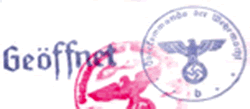
"The real tragedy," says Craig Hollander, "is that there isn't more. That's the implicit message — that you can't learn more because they were murdered."
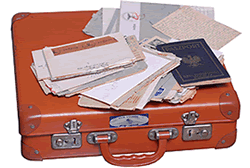
"Survivor guilt," it's called. And it was so strong in Joseph — who helped hundreds of Jews escape Europe before the war but was unable to save his own family — that he was incapable of dealing with the documents, Hollander says of the letters. "And with my parents dying violently . . . I was, on a certain emotional and psychological level, unable to tackle that process when I found them. It's a sort of parallelism there."
He did tackle it, however, bringing to the process decades of pent-up curiosity that enabled him to answer Browning's crucial question: How was Joseph, after the war, able to go on?
"It was my mother," Hollander says, seated in his Baltimore office, where the walls are splashed with the vibrant colors of a handful of oil paintings depicting the Caribbean and Mexico, all created by Vita. In the book, Hollander describes her as a gatekeeper. She "screened books, magazines, and movies for Holocaust themes," he writes, "to keep the Holocaust at a distance."
Her protectiveness was born of an exceptionally close relationship. "I could give you the names of hundreds of people who would vouch for the fact that no two people had a stronger, more loving marriage than my parents," Hollander says. He wasn't sure that he should include excerpts from their love letters in Every Day. But he eventually decided, and rightly so, that they'd help advance the story.
In 1945, for example, Joseph described to Vita the horrors he'd witnessed while marching with fellow soldiers through war-ravaged Europe. He despaired over not yet finding his family. In response, Vita wrote: "The news you have been looking for these years might be more attainable now — whether it be good or bad — at least you will know. We can look forward to and hope for the best — but please, darling, should it be bad — 'take it' and know that you have me to come home to — in another world."
That world, of course, would later be inhabited by Hollander, Ellen, and their children, whom Vita and Joseph were planning to take to Disneyworld at the time of the accident. Craig was just 4 then, but he has a few memories of his grandparents — one, in particular, of a restless sleepover at their house.
"I had one arm under my head, so I'd probably cut off the circulation," he recalls. "And my heartbeat in my ear was making me think I heard soldiers marching."
Joseph was soon by his side, asking what the problem was. After Craig told him, he tucked his grandson in and whispered, "You sleep now. I'm going to order the soldiers to stop marching."
Ya’akov Janek Hollaender
Watch Ya’akov Janek Hollaender's Testimony in Hebrew:
Surviving the Holocaust: Yaakov Hollander's Story
https://www.youtube.com/watch?v=1PHPd67kYp0
Ya’akov Janek Hollaender was born in 1928 in Krakow, to Avraham Moshe (son of David and grandson of Menachem Mendel) and Regina ( daughter of Jacob Jemreich) . He had 2 older brothers; Dolek and Benjamin Banek. A picture of the family before the war;
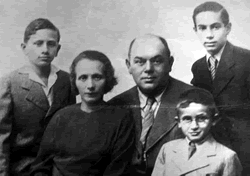
In 1940, the Jews were exiled from the town, and Janek’s family was forced to sell their property in order to survive. In 1942, they were taken to the Krakow ghetto, where Janek and his parents were separated from his two brothers. With rumors of an imminent Aktion, they hid themselves in a basement, where Janek’s father had placed a special lock on the door so it could not be opened from the outside.
Janek recalls their subsequent imprisonment in Plaszow with utter dread, because of the atmosphere of terror created by the camp’s commander, Amon Goeth, who regularly shot randomly in all directions. Janek and his brother Benek were later sent to Starachowice, and then to Auschwitz, where they looked after each other to the best of their ability. In the winter of 1944, the prisoners were marched to Mauthausen. Benek had difficulty walking because of a leg injury sustained while selling coal in Rideltau. Urged on by Janek, he managed to reach the camp, but collapsed, and Janek never saw him again.
In April 1945, the prisoners were taken on a death march to Gunskirchen. As news spread that the Germans had fled, Janek, weighing just 33 kilograms, managed to crawl out of the camp. He was taken to the Red Cross hospital, where he met soldiers from the Jewish Brigade. He decided to travel with them to Italy, joining a group of Jewish war orphans that was sent to a “Youth Aliya” camp in Selvino. There some 800 youngsters were trained for life in Eretz Israel. Meanwhile, Janek learned that his father had been murdered in Auschwitz, his mother had died in Plaszow, and his brother Dolek had been shot in Bergen-Belsen, just three days before the war’s end.
In 1947, Janek arrived at Kibbutz Mishmar HaSharon. After fighting with the Palmach’s Harel Brigade, he helped found Kibbutz Tse’elim in the Negev, along with other former children from Selvino . Bellow a picture of the children in Selvino.
Today Ya’akov Janek is a well-known composer, musical arranger and choir conductor.
In 1955, Janek married Devorah. They have two children and one granddaughter.
Yad Vashem reports by Aharon Holender, the uncle of Janek;
Benyamin Holender was born in Krakow, Poland in 1922 to Avraham and Regina. He was single. Prior to WWII he lived in Krakow, Poland. During the war he was in Krakow, Poland.
Benyamin was murdered in the Shoah.
This information is based on a Page of Testimony (displayed on left) submitted by his uncle aharon.
Haim Holender was born in Krakow, Poland in 1882 to David and Rivka. He was a diamond polisher and married. Prior to WWII he lived in Anvers, Belgium. During the war he was in Anvers, Belgium.
Haim was murdered in the Shoah.
This information is based on a Page of Testimony (displayed on left) submitted by his brother aharon.
-- Avraham Mosze Holender was born in Krakau, Poland in 1895 to David and Rivka. He was a furrier and married Regina. Prior to WWII he lived in Krakau, Poland. During the war he was in Krakau, Poland.
Mosze was murdered in the Shoah.
This information is based on a Page of Testimony (displayed on left) submitted by his brother.
Haim Holender was born in Nowesongi, Poland in 1880 to Menachem Mendel and Malka. He was a merchant and married Fridl. Prior to WWII he lived in Berlin, Germany. During the war he was in Marseille, France.
Haim was murdered in the Shoah.
This information is based on a Page of Testimony (displayed on left) submitted by his nephew.
Name:
Abraham Holländer
Departure Date:
29 Apr 1892
Destination:
New York
Birth Date:
abt 1875
Age:
17
Gender:
männlich (Male)
Residence:
Krakau (Kraków), Galizien
Occupation:
Arbeiter
Ship Name:
Weimar
Captain:
Thomas
Shipping Clerk:
B. Karlsberg
Ship Type:
Dampfschiff
Accommodation:
ohne Angabe
Ship Flag:
England
Port of Departure:
Hamburg
Port of Arrival:
Leith (Amerika via Glasgow)
Volume:
373-7 I, VIII B 1 Band 100
Household Members:
Name
Age
Abraham Holländer
17
Josef Holländer
9
Male Holländer
5
Morris Hollender and his wife, Edith, when they were at the sanatorium where they met after World War II.
A beautiful article on my late cousin, Morris Hollender, who passed away last month.
Ian Pomerantz wrote to Tracing the Tribe - Jewish Genealogy on Facebook March 2015
..passed away at age 88; survived Auschwitz, kept traditions, melodies alive
Standing in line outside a cattle car bound for Auschwitz-Birkenau in 1944, Morris Hollender followed orders and surrendered all his possessions.
When the Nazi guards turned their backs for a few seconds, though, he grabbed his tefillin — small black boxes with parchment inscribed with words from the Torah — which he hid under his loose overcoat. Had the guards noticed, he would have been killed, but on the long ride to the concentration camps, a rabbi put the tefillin to use leading the prisoners in prayer.
Upon his arrival, guards confiscated the tefillin and tattooed A-10103 on his left arm. He still began and ended his 12-hour days of hard labor with prayers, though, and recalled later that the ritual helped sustain him.
Years later, he chronicled his experiences in a hand-written letter to friends, giving copies to all who asked how he survived.
In one vivid account, he wrote of being forced to use human remains to fertilize the grounds: “From time to time I found pieces of human bones that were not completely consumed by the heat and fire. I was holding those bones in my hands and couldn’t stop crying while thinking that these may be the bones of my parents.”
Mr. Hollender, who for years read each week’s Torah portion at Temple Beth Israel in Waltham and recorded hundreds of melodies from his youth, died Dec. 30 in Evans Park senior living in Newton, his home since last year. He was 88 and had lived in Waltham and Watertown.
In a 2001 oral history video interview, he recalled that Czechoslovakian Jews had nearly an idyllic life during his boyhood in the small village of Vysni Remety. “I was very lucky that I was born in a free country, which gave so much freedom to all the minorities,” he said.
His father was a sixth-generation farmer and ran a variety shop. Mr. Hollender’s brother was studying to be a cantor and brought home dozens of melodies. “So, really, my boyhood until the age of 12 was a perfect one, the family was together, and everything was just fine, and we were very hopeful that nothing would happen to us,” he said in the oral history.
Then in 1944, his family was among those rounded up and sent to Auschwitz.
“Nobody suspected what Auschwitz really is,” he wrote in his letter. “We noticed a few barracks where entire families were outside in the sun and parents were playing with their children.” That scene, he added, “was all camouflage in order to prevent suspicion or resistance among us.”
As he and his parents parted at the concentration camp, his father offered blessings and said: “I hope you will survive because you are able to work hard.” Mr. Hollender’s father was then taken to the gas chambers, and his mother died the same day.
For months Mr. Hollender dug canals to drain swampy areas, cut grass and pressed it into big blocks, and harvested seeds. Four months into the hard labor, he felt feverish and was sent to the hospital. He was nearly ordered to the gas chambers, but two doctors declared he was healthy enough to work.
In January 1945, anticipating the Soviet army’s approach, the Nazis sent most prisoners on a long march, with many dying from exhaustion or extreme cold. The prisoners marched to a concentration camp in Ebensee, Austria. The Kapos — prisoners the Nazis tapped to supervise other prisoners — saw Mr. Hollender’s shoes and beat him for trying to keep shoelaces his father had made.
“To them it was entertainment whenever they used their sadism to inflict on us painful beatings,” he wrote in the letter.
A few months later, US soldiers arrived and “it is hard to describe the emotions, which were running high among the soldiers and prisoners,” he wrote.
He was taken to a Budapest hospital to recover from tuberculosis and then to a sanitarium run by nuns in the Tatra Mountains. While there, he met Edith Grossman.
“Gradually we became interested in each other by telling about all our sad experiences,” he wrote. “At that time when our prognosis of recovering was uncertain, our mind was not occupied with possible marriage.”
They married in 1950, and regaining their health, moved to Liberec, Czechoslovakia, where his sister Serena lived. She was the only other survivor from his immediate family. Along with his parents, two brothers and two other sisters died in the Holocaust.
Serena moved to the United States, leaving them her furnished apartment. Mr. Hollender began running a tobacco shop and expanded it to sell stationery, stamps, newspapers, and magazines.
In 1967, the couple moved to New York City and then settled in Boston, where the Jewish community connected them with services for immigrants, including a furnished apartment in Dorchester. They moved to Waltham, learned English, and he worked as a calibration technician.
The Hollenders became very active at Temple Beth Israel in Waltham, and after moving to Watertown about a decade ago, he rode the bus to Waltham each day at 6:30 a.m. to open the temple’s doors. As his eyes began to fail with age, he memorized entire Hebrew texts from the Torah to chant Saturday mornings.
Hankus Netsky, who chairs contemporary improvisation studies at New England Conservatory, said that when he first heard Mr. Hollender “it caught my ear right away that this man was singing in a manner that was older in a way, that sounded like it just was handed down.”
Netsky, who began recording the songs, said Mr. Hollender “was a gem, a national treasure who was right here in Waltham. And the other thing that was beautiful was that this congregation empowered him. They put him on a pedestal.”
Ellen Band, a prayer leader at the temple, said Mr. Hollender “was a fount of never-ending little melodies that were related to stories and traditions. And it seemed like there was no end to it, and that was so beautiful.”
For their 50th wedding anniversary in 2000, the Hollenders traveled to Auschwitz and brought back dirt that they placed in Temple Beth Israel’s cemetery in remembrance of relatives who died in the Holocaust.
A service has been held for Mr. Hollender, who leaves his wife and sister, of North Miami Beach, Fla. Burial was in Temple Beth Israel’s cemetery. A memorial tribute concert featuring music from melodies he preserved will be held at 2 p.m. March 29 in Temple Beth Israel in Waltham.
Though Mr. Hollender and his wife had no children, “he was the Jewish parent or grandparent whom people either had or wish they had,” said Mark Frydenberg, a temple member.
Joseph Weintraub, who also attends services at the temple, said Mr. Hollender often began by saying: “ ‘Here’s how my father used to sing,’ and sometimes it would be these melodies that would feel like the heavens were opening up.”
Emma Stickgold can be reached at estickgoldobits@gmail.com
